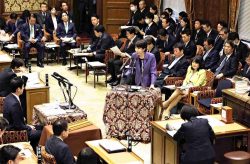14:49 JST, October 17, 2021
The question is how to deliver aid to the people in Afghanistan amid their hardships while maintaining a certain distance from the Taliban’s interim administration.
Now is the time for the United Nations to take the lead in addressing this issue. The cooperation of the United States, Britain, France, China and Russia — the U.N. Security Council’s permanent members — is essential for this.
Two months have passed since the Islamist Taliban seized control of Afghanistan. Government institutions are still not functioning properly, and the economy continues to be paralyzed.
The cause for this situation lies with the Taliban. The interim cabinet is far from being the “inclusive government” which they had publicly promised it to be, as personnel from the previous government nor women have been appointed to it. It is unclear whether the Taliban will be able to cut off cooperation with international terrorist organizations and guarantee women’s rights.
Western nations that are critical of the Taliban, as well as nations such as China and Russia that have relatively close relations with the Taliban, are carefully assessing the regime’s actions. Not a single country has recognized the interim government.
Under such circumstances, the fact that the plight of the people in Afghanistan is growing more serious must not be overlooked.
Foreign aid has been cut off, civil servants have not been paid and public services have largely been suspended. Cash withdrawals at banks have been restricted. As many as 14 million people are said to be facing hunger. A humanitarian crisis is imminent ahead of the harsh winter.
The Group of 20 major countries and regions have held a special online summit and agreed on the urgent need to provide assistance to Afghanistan. The European Union announced it would pledge ¥130 billion and Japan said it would give ¥22 billion.
It was a natural decision to extend a helping hand from a humanitarian standpoint while putting aside the issue of recognizing the Taliban administration for the time being. The worsening situation could lead to terrorist organizations becoming active and a massive refugee outflow.
The question is how to provide aid. Aid supplies must not be diverted to the Taliban. The United States says it will deliver the aid directly to the people through international organizations. Otherwise, it will be difficult to ensure transparency while embassy staff and others have evacuated.
The Taliban must allow free entry and exit for those involved in the relief effort and ensure the smooth transportation of goods. This is an important step in revitalizing the economy and gaining public support and recognition from other countries.
It is regrettable that Chinese President Xi Jinping and Russian President Vladimir Putin did not participate in the G20 meeting, revealing discord with Japan, the United States and the European Union.
Dealing with a humanitarian crisis is a common international challenge. China and Russia should work together to achieve stability in Afghanistan, considering this issue as separate from the political confrontation with the United States.
Top Articles in Editorial & Columns
-

Riku-Ryu Pair Wins Gold Medal: Their Strong Bond Leads to Major Comeback Victory
-

Reciprocal Tariffs Ruled Illegal: Judiciary Would Not Tolerate President’s High-Handed Approach
-

China Provoked Takaichi into Risky Move of Dissolving House of Representatives, But It’s a Gamble She Just Might Win
-

Japan’s Plan for Investment in U.S.: Aim for Mutual Development by Ensuring Profitability
-

Flu Cases Surging Again: Infection Can Also Be Prevented by Humidifying Indoor Spaces
JN ACCESS RANKING
-

Producer Behind Pop Group XG Arrested for Cocaine Possession
-

Japan PM Takaichi’s Cabinet Resigns en Masse
-

Man Infected with Measles Reportedly Dined at Restaurant in Tokyo Station
-

Israeli Ambassador to Japan Speaks about Japan’s Role in the Reconstruction of Gaza
-

Videos Plagiarized, Reposted with False Subtitles Claiming ‘Ryukyu Belongs to China’; Anti-China False Information Also Posted in Japan






















